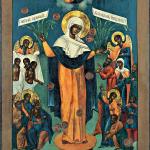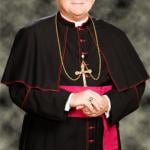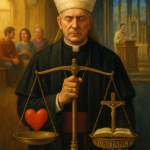Last updated on: August 30, 2016 at 10:47 pm
By
CNA Daily News
Ulaanbaatar, Mongolia, Aug 30, 2016 / 04:47 pm (CNA/EWTN News).- On Sunday Mongolia witnessed the ordination of its first indigenous priest, Fr. Joseph Enkh Baatar, a 29-year-old man who represents the first fruits of 24 years of missionary work in the east Asian country. Bishop Wenceslao Padilla, the prefect of Ulaanbaatar, ordained Joseph Enkh Baatar a priest at an Aug. 28 Mass at St. Peter and Paul Cathedral in the Mongolian capital. “Fr. Joseph’s ordination is a blessing of God and a moment of immense joy and inspiration for our young Mongolian Church,” Chamingerel Ruffina, a member of the organizing committee for communications at the National Catechetical Center of Mongolia, told CNA Aug. 30. The first modern mission to Mongolia was established in 1922 and was entrusted to the Congregation of the Immaculate Heart of Mary. But under a communist government influenced by the Soviet Union, religious expression was soon thereafter suppressed. Bishop Padilla, a member of the Congregation of the Immaculate Heart of Mary, was one of the first three missionaries allowed into Mongolia in 1992, after the fall of communism. He became superior of the mission in Mongolia, and was instrumental in helping to discern Fr. Baatar's vocation. The bishop praised God for the historic moment of the apostolic prefecture's first native vocation, and prayed that many more such vocations would arise to help the local Church. The Mass was concelebrated by Archbishop Osvaldo Padilla, apostolic nuncio to Mongolia and Korea; Bishop Lazarus You Heung-sik of Daejon, in South Korea; and more than 100 priests from South Korea and Hong Kong. More than 1,500 persons attended the Mass, including dignitaries of foreign embassies, local Orthodox churches, and Buddhist monks. The Mass was followed by joyous festival. Ruffina commented that “This meaningful liturgical celebration of the sacrament of priestly ordination conducted in their own indigenous language gave an opportunity to the faithful to actually witness in proximity, to celebrate, and to understand the various steps in preparation for the priesthood and the ordination rite.” The faithful of Mongolia had prepared for the event by reciting a novena to St. Paul to strengthen their missionary spirit during the Year of Mercy. Fr. Baatar was born June 24, 1987. He lost his father at a young age, and his sister introduced him to the Catholic faith. His dream of joining the priesthood was initially postponed, due to his family's strong desire that he complete his university studies. After graduating with a degree in biotechnology and with the support of his family, he then applied to become a seminarian for the Prefecture Apostolic of Ulaanbaatar. Fr. Baatar entered the Daejeon seminary in South Korea, and was ordained a deacon in December 2014. Concluding the Mass, the newly ordained priest profoundly thanked his family and his mentors at the seminary, especially Bishop You. He also praised the important role played by Bishop Padilla through his support of his vocation. Fr. Baatar urged the faithful to pray for his priestly ministry so that he could faithfully fulfill his ordination motto, chosen from the gospel of Luke: "Deny yourself, take up your cross daily, and follow me." “I thank the Lord who has called me to serve Him through the priesthood. I am also grateful to all the people who have helped me respond to this calling,” Fr. Baatar expressed. Bishop You reminded the new priest that “the best way of announcing the good news is a life of witnessing.” Commenting on the vast missionary work that lies ahead in Mongolia, the South Korean bishop said, “Fr. Joseph, being a Mongolian citizen, has to live as a missionary in his own country.” Ruffina also recounted that the parishioners of Saint Mary’s parish gave Fr. Baatar a Bible which was handwritten by the parishioners themselves. A young family ministry volunteer, Clara Gantesetseg, told CNA that “the ordination gift of Fr. Joseph Enkh is sign of hope to our people in Mongolia, and a special a gift during this Year of Mercy.” Clara noted that “Fr. Joseph’s indigenous roots, his cultural and life experiences of his own and the people, will help to transcend the teachings of the Church to the local culture for better understanding, and also will foster interreligious dialogue.” Among the guests at the Mass was the Abbot Dambajav of Dashi Choi Lin Buddhist Monastery. He praised the efforts of the Catholic Church and encouraged Fr. Baatar to take up the responsibility of helping the Mongolian people. He also gave the new priest a blue khadag, a ceremonial scarf, as a mark of friendship. Ruffina pointed out that the Buddhist monk's participation and his kind words of encouragement will further forge bonds of friendship and interreligious dialogue between the communities for peaceful co-existence. A little over half Mongolia's population is Buddhist, and following the decades of communist rule, 39 percent of Mongolia's population is non-religious. Islam, shamanism, and Christianity have mere footholds among the people. The Prefecture Apostolic of Ulaanbaatar serves all of the estimated 1,200 Catholics in the country, which has a population of 3 million. In 2014, the local Church had three diocesan priests, who were aided by 14 religious. Read more















